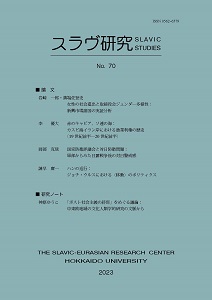「ポスト社会主義の終焉」をめぐる議論―中東欧地域の文化人類学的研究の文脈から
Anthropological Arguments on the “Demise of Post-Socialism” in Central and Eastern Europe
Author(s): Yuko KambaraSubject(s): Political Philosophy, Government/Political systems, Cultural Anthropology / Ethnology, Post-Communist Transformation
Published by: Slavic Research Center
Keywords: post-socialism; collapse of communism; anthropology of post-socialism; cultural anthropology; Central and Eastern Europe;
Summary/Abstract: The term “post-socialism” has been extensively employed in Central and Eastern European (CEE) studies for over three decades following the collapse of communism. Despite this, academics concurrently debate the continued applicability of the postsocialism concept in anthropological research. The anthropology of post-socialism was established as a field within cultural anthropology during the 1990s, and anthropologists specializing in CEE widely adopted the post-socialism concept. By the mid-2010s, postsocialism was deemed to have lost its significance as a research concept; concurrently, the critical discourse on the post-socialism concept also gained traction among cultural anthropologists. This paper scrutinizes the influence of the post-socialism concept on CEE’s cultural anthropology, drawing from recent scholarly debates. Reviewing anthropological papers that invoke the post-socialism concept in cultural anthropology, this paper elucidates how anthropologists have engaged with post-socialism and the directions it has led them. Up until the mid-2000s, anthropologists conducting research in the CEE region recognized the limitations of the post-socialism concept, yet remained focused on the remnants of socialism in their fieldwork. The anthropology of post-socialism thrived during this time. However, in the latter half of the 2000s, anthropologists from the CEE region began to criticize the use of the post-socialism concept in CEE studies. These critics contended that the term “post-socialism” itself inadvertently maintains CEE within the “East” of the “East/West” framework, perpetuating its reproduction. Furthermore, previous post-socialist anthropology, which primarily focused on the economic structure of rural areas or political concerns, not only constrained its potential for theoretical evolution within the anthropology field, but also reinforced post-socialist stereotypes. Conversely, scholars who abstained from post-socialism debates have made fewer references to postsocialism in regional ethnographies due to CEE’s societal transformation. These debates concerning post-socialism have occasionally muddled the discourse, raising a multitude of issues related to post-socialism, such as the appropriateness of analyzing current research fields through the conceptual lens of post-socialism, the theoretical potential of post-socialism within cultural anthropology, and the issue of perpetuating the “East/West” paradigm inherent in the concept of post-socialism. Despite these challenges faced by anthropologists, such critiques of post-socialist anthropology have stimulated a diversification of anthropological research in CEE, extending beyond the scope of postsocialist anthropology.
Journal: Slavic Studies
- Issue Year: 2023
- Issue No: 70
- Page Range: 137-158
- Page Count: 22
- Language: Japanese

